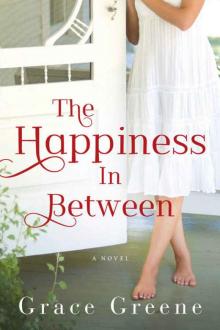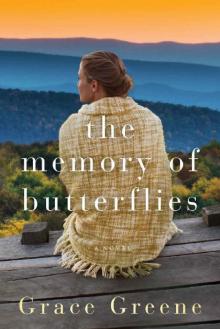- Home
- Grace Greene
The Happiness in Between Page 5
The Happiness in Between Read online
Page 5
She returned to the car and searched it one last time, and then finally gave up hope.
Her mother was right. Trent was right. She wasn’t a survivor. She was a natural victim. Trent had explained the points of failure to her many times. He’d learned them from his father. Per Trent’s points, there were two types of people. If you weren’t a survivor, then you were a victim. For natural victims like her, failure was inevitable.
The last time they’d discussed that particular point had been during their second marriage. They were living in Arizona, and she now viewed it as the beginning of the end, the final end, the last gasp, of their unhappy second attempt. He had fired up the grill and was cooking thick steaks out by the pool. She’d seen the new, shiny motorcycle in the garage and was angry.
“You bought a motorcycle?”
“You bet. Decided I deserved a treat.”
Sandra waved away the smoke drifting over from the grill. “Didn’t I tell you I needed a new outfit for that job interview? You told me we couldn’t afford it.” She pointed back toward the garage. “What you spent on that bike could fill my closet. The insurance alone will cost a fortune.”
“You don’t need a job anyway, Sandy. I earn enough for both of us.”
“Trent, you’re the one who’s always talking about being a survivor. Survivors support themselves, right? In times of trouble, they aren’t dependent upon others.”
“You, a survivor? You have me. You don’t need to worry.” Trent turned the steaks on the grill. “See? I can cook.”
She tried to explain it from another angle. “It’s more than that, Trent. It’s about partnership and fairness, too. You’ve spent a lot of money without talking to me. We’re supposed to be working on our communication. You know I want things to be good between us.”
Trent turned fully toward her, his smile gone. “Is that it? Are you saying that if you don’t get what you want that you’ll make sure things aren’t good for us?” He slapped his hand with the spatula, heedless of the grease and bits of beef transferring to his hand.
She moved to the other side of the pool. “That’s not what I said.”
He nodded, his expression easing. “You’re right, Sandra. I apologize. I remember my dad telling me that being a survivor is all about knowing what you want and doing what is necessary to get it. If that’s you, then go for it. Do what you think is best, Sandra. You won’t hear another word about it from me.”
And she had. She’d gone to the mall the next day while Trent was at work, and she’d purchased the perfect silk blouse and a red skirt for the job interview. She’d stood taller, feeling as if she’d made a stand, had drawn on her inner strength, had faced Trent down. He’d seen he was wrong, and it had all worked out. That evening, he made a joke of shuddering at the cost on the price tags but had complimented her appearance. Before he got his revenge.
Inner strength? What a sick joke. The kind of joke that strong people played on those who weren’t. She looked inside, and instead of her own voice, all she could hear was Trent’s.
The itchy-scratchy scalp was wearing her down. It was the soap, she told herself. She washed her hair every day. She hated the look of oily, dirty hair. But it was hard to wash soap out of long hair in a restroom sink.
Aunt Barbara didn’t call, and Sandra realized she wasn’t going to. She thought of calling her mother. Poor Mom. Down in Florida with a husband who could no longer manage on his own and who needed the full attention of his wife.
Sandra no longer phoned the temp agencies. She’d been a pest. Desperation did that to people. The managers asked her not to call every day, that if they had something for her, they’d contact her. They hadn’t, and she understood now that they wouldn’t. That hope was gone.
Dreams colored her sleep with images of bedbugs infesting her car and lice burrowing in her scalp. When she woke in the night, she understood that her world was only going to get darker.
In the morning, she was lost in misery. It didn’t have to stay this way, she told herself. Whichever direction her life would take, she had to seize control again. She watched the sunrise and dug her fingernails into her hair and scratched her scalp. It was driving her crazy.
She’d had a super-short haircut when she was a kid. Age nine, she thought. She’d hated it at the time, but she’d gotten lots of compliments, and people said it made her eyes and her face more striking. What those people didn’t know was that there’d been a lice breakout at her school. Her mother had washed her hair over and over with that special shampoo and had finally dragged her to the beauty salon and had them cut it. The long tresses had fallen as if weightless, silently curling into themselves as they hit the tile floor.
Sandra hadn’t thought about that haircut in a long time and had completely forgotten the reason for it until this morning. Now the old memory fell into place with the mindless grace of that long-ago hair coiling onto the floor where it landed.
She could solve this one problem, at least.
She located the scissors in a bag in the trunk and went to the park’s ladies’ room. She ran her fingers through the length of her thick hair, dark like her father’s. Trent had liked her hair long. She’d talked about cutting it. He’d been upset, had made her promise not to. Keeping it long meant a great deal to Trent. It meant a lot more to him than cutting it had meant to her, and she’d given up the idea.
She lifted the scissors and held them in front of the mirror, flexing the fingerholds so that the blades snicked open and closed over and over. She ran the fingers of her free hand through her hair again, pulling it out and away from her face. The scissors seemed to drive themselves. The cool blades pressed up near her scalp and slid back together. Sandra gasped. By the dim yellow light above the restroom mirror, the hair fell, dark, almost alien, and as silent as that childhood haircut, into the sink.
The gasp didn’t repeat. This felt appropriate. The cut was inelegant, and she kept tweaking at it, snipping, trying to even it up, until finally there wasn’t much left.
Sandra pressed her fingers against her scalp, pushing and massaging. She closed her eyes and felt such lightness, weightlessness, it was almost unbearable. She opened her eyes, and all she could see were those eyes, so dark, exactly like her mother’s, staring right back at her. She was no Audrey Hepburn, no Jaimie Alexander, and frankly their short cuts had had more hair than was now on her head. She was just Sandra, and now she had no hair, and it was no one’s business but hers.
She gathered up the butchered hair and dropped it into the trash, brushing at the orphan strands as they clung to her fingers.
Her being felt lighter, but her scalp still itched. She bent over the sink and ran the water over her scalp, rubbing and massaging and grateful that the faucet was the old-fashioned kind that kept running until it was physically turned off.
When she was done, she tried not to linger at the mirror, not ready to deal with regret. Really, why did park restrooms need mirrors anyway? The glimpse she caught from the corner of her eye was enough. Punk or Goth or something like that. Not a model, not an actress. If her eyes looked bigger, so did the purple patches under them. They reminded her of the ones she’d seen on her mother’s face that last day.
She looked away and pushed past the door, wanting fresh air. At least the itching had stopped.
Sandra was back in a park, but this one was far enough out of town that she didn’t have to share it with the homeless, yet not so far that the trip burned a lot of gas. She was crossing the picnic area, heading to the ladies’ room, when the phone rang. Her aunt? Her mom?
Frantic, she almost fumbled the phone. “Hello?”
“Sandra? That you?”
“Yes, it’s me.” Suddenly breathless, she stepped into the ladies’ room and checked the stalls. She was alone.
“This is your Aunt Barbara, dear. How are you doing? I got your voice mail. There was some kind of delivery delay. Did you get mine? No? Well, I’m flying out to Florida in two days. Why don’t you
drive out to the cottage? We can visit tonight and tomorrow, and then you can drive me to the airport the next morning to catch the flight.”
“I didn’t get your message.” Sandra’s voice was shaky. She’d practically buried Barbara . . . at least the idea of her calling. Her uneasy sense of reality quaked.
“You OK, dear? You sound funny.” Barbara cleared her throat. “Now if the timing’s not good for you . . .”
The thought of seeing her aunt was almost overwhelming. Somehow the world had moved on without Sandra. Barbara said a neighbor could bring her into town if that worked better for Sandra’s schedule.
Her schedule? Her nerves were shot. As she rushed to answer, she turned and saw herself in the mirror. Really saw herself. As if looking through her aunt’s eyes.
How much money did she have left? Enough to pay for a hotel room for two nights and a tank of gas? She stared in that bathroom mirror at her haunted face, the shadows dark beneath her eyes, the hollow look, and knew she couldn’t pretend at this level. Two nights in a hotel, hot showers, and a decent bed would go a long way to bringing her back so that she could face her aunt.
“Actually, if you could get that ride to town, that would be great. We could meet near the airport and have a short visit before I take you the rest of the way.”
Aunt Barbara agreed. They set a time and meeting place, and she rambled on for another few minutes before they said good-bye. The last of the conversation was a blur to Sandra.
The one upside to the sad, miserable story was that if Trent had been following her, somehow tracking her at her mom’s house, then he must have lost the trail by now. Maybe, in the end, the trauma was worth it.
No, it wasn’t.
Less than two weeks ago, Sandra had wanted to punish her mother, had wanted her to know her feelings were hurt, that she had let her down. Sandra had also wanted to avoid her aunt’s questions and criticism. Pride? Resentment? Had it been worth it? No. Her reflection in the restroom mirror frightened her. Less than two weeks adrift on her own, and she was at the lowest point of her life—one of Trent’s points of failure? This was more like a cascade of failures. On her own, she was doomed to fail. There was nothing to be done, no lessons learned, only a dark time to be packed away into the darkest corner of her mind and forgotten. That she could do.
She pressed her hands against the smudged mirror, almost touching the dark bruises under her eyes, seeing the dirt under her fingernails. She was thirty and had failed so badly, she didn’t know if she could find her way back.
CHAPTER THREE
Sandra saw Aunt Barbara standing on the sidewalk outside of the fast-food place at the intersection of Nine Mile Road and Airport Drive. Her aunt’s friend could have driven her the final mile to the airport, but Barbara wanted to see Sandra in person, however briefly, to give her the key and share instructions. More than that, her aunt probably wanted to reassure herself that Sandra was capable of keeping her promises. Well, Sandra could and would. She might be a failure on multiple levels, but she could manage house-sitting and a dog.
Her aunt gripped the handle of her black upright suitcase with one hand while her other was shading her eyes as she scanned the area. A large leather tote bag with lots of bling hung from her shoulder, and she was wearing jeans, cowboy boots, and a purple and orange sweater vest. As Sandra pulled into the parking lot, her aunt leaned forward, squinting at the car. Barbara’s long curly hair, now all gray, blew across her face, and she pushed it away.
Sandra rolled down the car window and waved. Her aunt’s posture relaxed.
So far, so good, thought Sandra. Two nights of civilization had had amazing restorative powers, though it had cost most of her remaining cash. A manicure, shampoo and conditioner—all that good stuff. It meant as much as, or more than, the tangible value it actually delivered. It meant, among other things, that the planet still turned and was steady in its orbit, and all was as it should be. It might not be totally true, but it gave one permission to believe.
Sandra parked her car at her aunt’s sandaled feet, swung the door wide, and stepped out.
“Hi, there. Ready for your trip?” Sandra flashed a bright smile, determined to keep the tone light, social, and impersonal.
“Am I ready?” Barbara echoed, her voice high and a little shrill. “I’ve been ready. I was worried you wouldn’t show. I was racking my brain trying to figure out what I’d do if you didn’t.”
“I’m here, so no worries.” Sandra hugged her aunt, then took the suitcase. “In fact, I think I’m a little early.”
“I wasn’t sure I’d recognize you after so long.”
Sandra awkwardly lifted the suitcase onto the narrow backseat, but she managed. Better that than to open the trunk and expose the truth of her entire self-worth to her aunt.
Barbara paused, seeing the nicked paint and the dented fender. “That’s your dad’s old car, isn’t it?”
“Yes, ma’am. It doesn’t look great, but it runs fine.” Sandra opened the passenger door and held it for her.
“So long as it works. That’s the main thing, certainly.” She patted Sandra’s arm as she climbed into the car. “It’s not a short drive out to my place. Can’t risk you not making it there. What would happen to Honey?”
Her aunt’s voice was playing “Chopsticks” on her nerves. And yet, something was stirring in the back of her brain. A familiarity she’d forgotten.
As Sandra slid into the driver’s seat, Aunt Barbara looked at her gravely. “You remember the way to Cub Creek?”
The lines around Aunt Barbara’s eyes and mouth were deeper than Sandra remembered. Her skin was pale and looked fragile and dry.
“Of course I remember.” Sandra paused before backing out the car and touched her aunt’s arm. “Did you eat breakfast?”
Aunt Barbara shook her head. “I’m too excited for food. I’ve never flown before, you know. I’ve never even left Virginia.”
“Try to get something at the airport, OK? Go through security and to your gate. They’ll have shops there with pastries and such.” Something her mom had often said popped into her head. “You need your energy.”
Barbara took Sandra’s hand and pressed something into her palm.
“The key. Don’t lose it. But if you do, there’s a spare under the fake rock by the shed in the backyard.” She closed Sandra’s fingers around the key. “Now, as soon as you drop me off, go straight to the house. Don’t change your mind or get distracted. Honey is home alone.” She stared intently as if to underscore the meaning. Apparently satisfied Sandra understood, Barbara sat back in her seat and pulled the seat belt across to latch it.
“All set, then. You look well, Sandra.” Barbara coughed. “No, you don’t. I wish I could be one of those polite people who say the right things instead of blurting out the truth. You look awful. What did you do to your hair?”
Sandra ran her fingers through the close-cropped, uneven edges. “I cut it myself. You don’t like it?”
Barbara snorted softly. “You’re trained to cut hair?”
“No.”
“Didn’t think so. You’re skinny, too. When’d you get so thin?”
Her aunt was right. Sandra knew how she looked. Then again, Aunt Barbara wasn’t looking so hot herself, not with those straggly eyebrows and that full, frizzy, old-hippie hair. How could sisters be so different?
“You don’t do drugs, do you?” Aunt Barbara asked.
Sandra stared, her mouth gaping, until her lips managed to form the word no.
Aunt Barbara patted her arm. “Glad to hear it,” she said and nodded. “You need a good rest, that’s all, and you’ll get it at Cub Creek.”
“Cub Creek?” Sandra tried to lighten the tension by joking. “I hope there’s a roof and walls, too.”
Barbara’s expression went blank, then the lines in her face rerouted, and she laughed. Her laughter was high and musical. “You’ve been there, so you know perfectly well there’s a house. What you are is a So Silly. That�
�s what our mama used to call us girls. She’d call us So Sillies. It was from an old fairy tale, I believe.”
Sandra took a deep breath and let it go. She forced a smile, trying to respond to her aunt in kind, and it paid off as her own tension seemed to ease. “Heaven knows I need a rest. Get yourself some rest, too, and have fun. Mom’s looking forward to your visit.”
“Too bad you couldn’t come to the house a few days early. We could’ve enjoyed a visit. I’ve been curious as to what you’ve been up to. And of course, all that business with your husband. Marriage isn’t easy, I know. Or rather, so I hear.” She waved her hand. “Never having been married, I guess I wouldn’t know, not personally, but I can certainly see what’s what. More importantly, I could’ve helped you settle in. Shown you around. You haven’t been to my house in . . . I don’t know how long. You could’ve driven me directly to the airport from there.”
“Sorry I couldn’t make it work,” Sandra answered, not exactly truthful but not wanting to go into detail about her lost two weeks. Her dismal failure. But her aunt hardly paused.
“Fred didn’t mind taking me. He comes into work this way every day.” She sighed. “I’m looking forward to seeing Meg, if I can survive the airport and the plane. If she’d waited, I could’ve driven down with her and helped with the driving, and Honey could’ve come, but no . . .” Aunt Barbara gripped her tote bag in a white-knuckled clutch. Her hands trembled. “I’m not as young as I used to be.”
Sandra glanced over at her and noted the wide eyes, round and dark, and her aunt’s constantly moving hands, the agitated fingers.
The DEPARTURES sign was ahead. Sandra turned the other way.
“Where are we going?” Barbara asked.
Instead of heading to the drop-off curb, Sandra drove to the hourly parking deck. “I’ll walk you to the ticketing counter. It’ll give us a few more minutes to visit.”

 Wildflower Hope (The Wildflower House)
Wildflower Hope (The Wildflower House) The Happiness in Between
The Happiness in Between The Memory of Butterflies: A Novel
The Memory of Butterflies: A Novel Clair (Beach Brides Book 4)
Clair (Beach Brides Book 4)